The PM Vishwakarma Scheme, introduced on September 17, 2023, during Vishwakarma Jayanti, is a government initiative aimed at enhancing the quality and accessibility of products and services provided by artisans and craftspeople. The scheme comes under the ministry of micro small & medium enterprises. It seeks to integrate these artisans, often referred to as Vishwakarmas, into both domestic and global value chains. The scheme’s ultimate goal is to provide comprehensive support to these artisans, enabling them to advance in their respective trades and improve their socio-economic status and overall quality of life. The scheme is fully funded by the Indian government with an initial allocation of Rs 13,000 crore and will be implemented for five years.
Apply Online For PM Vishwakarma Scheme
Table of Contents
What is the PM Vishwakarma Scheme?
A novel initiative known as ‘PM Vishwakarma Scheme’ or ‘PM Vishwakarma Yojana’ was introduced on 17th September 2023 on the occasion of Vishwakarma Jayanti. The objective of the scheme is to enhance the quality and expand the accessibility of artisans’ and craftspeople’s products and services. The scheme’s aim is to seamlessly integrate Vishwakarmas into both domestic and global value chains.
The overarching goal of this scheme is to provide comprehensive support to Vishwakarmas, specifically artisans and craftspeople, enabling them to progress within their respective trades and ascend the value chain.
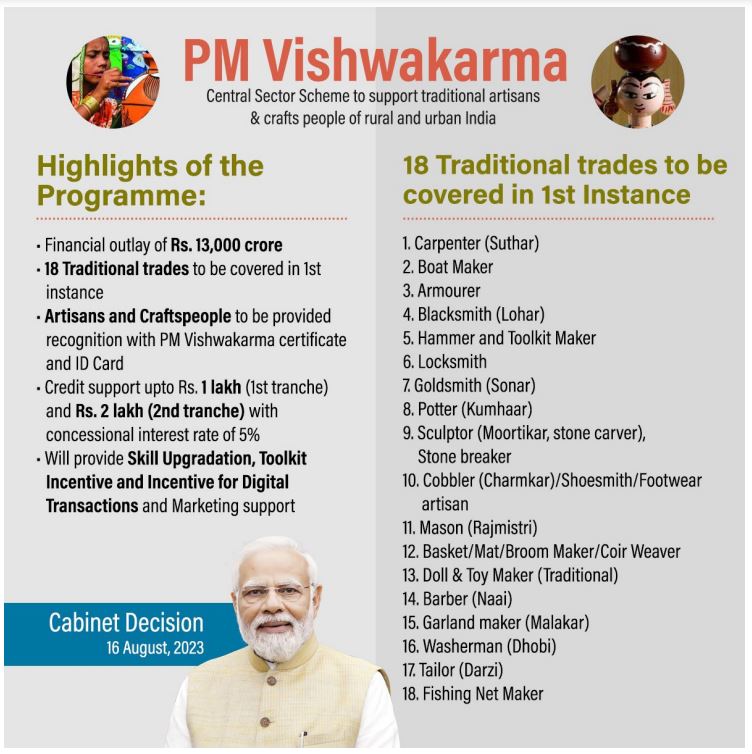
This initiative is set to revolutionize the way these occupations are practiced by artisans and craftspeople, ultimately elevating their socio-economic standing and improving their overall quality of life.
- PM Vishwakarma is set to be executed as a Central Sector Scheme, entirely financed by the Government of India, with an initial allocation of Rs 13,000 crore.
- The Scheme will be jointly administered by three key entities: the Ministry of Micro, Small and Medium Enterprises (MoMSME), the Ministry of Skill Development and Entrepreneurship (MSDE), and the Department of Financial Services (DFS) within the Ministry of Finance (MoF), all under the Government of India.
- MoMSME will function as the lead ministry for the Scheme, with the Additional Secretary & Development Commissioner (MSME) at the Ministry of MSME serving as the central point for all aspects of implementation and coordination. You can contact them via email at dcmsme@nic.in or by phone at 011-23061176.
- The PM Vishwakarma initiative will have an initial implementation period of five years, concluding in 2027-28.
Who Are Vishwakarmas?
A significant portion of India’s workforce comprises artisans and craftspeople who utilize their manual skills and tools. Typically self-employed, they fall under the umbrella of the informal or unorganized sector of the economy. These traditional craftsmen and craftswomen are known as ‘Vishwakarmas’ and are involved in various trades such as blacksmithing, goldsmithing, pottery, carpentry, sculpting, and more. These vocations are handed down from one generation to the next, following a traditional training model that involves mentorship within families and other informal artisan communities.
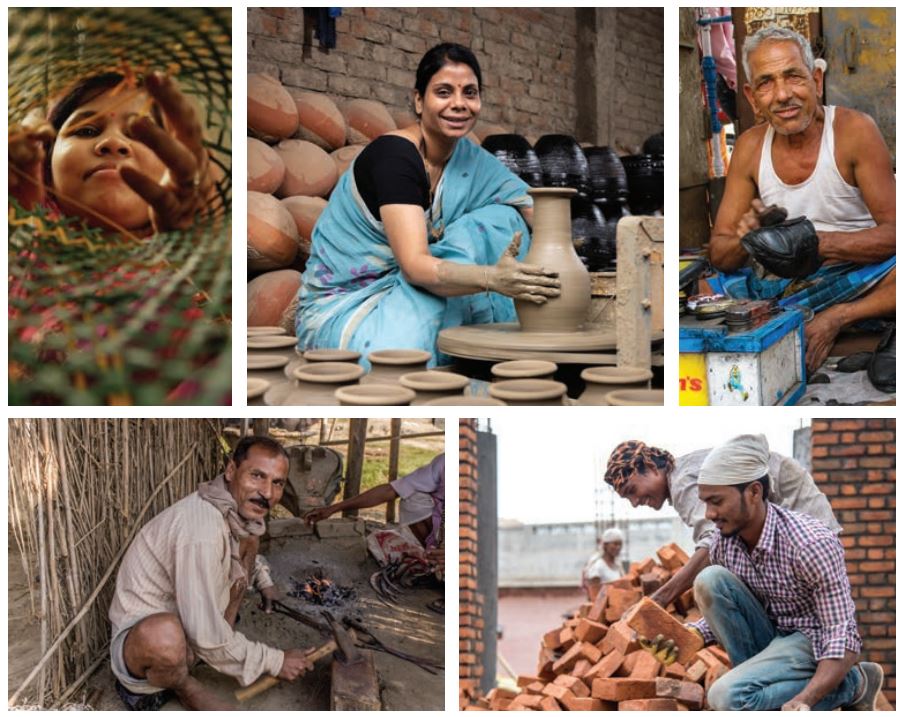
The objective of the PM Vishwakarma Scheme
The objectives of the PM Vishwakarma Scheme are as under:
- Facilitating the recognition of artisans and craftspeople as Vishwakarma, thereby granting them eligibility for all the benefits offered under the Scheme.
- Offering skill enhancement opportunities to refine their abilities and ensuring the availability of relevant and suitable training programs.
- Providing assistance in acquiring better and modern tools to augment their capacity, productivity, and the quality of their products and services.
- Enabling beneficiaries to access collateral-free credit easily and reducing the cost of credit through interest subvention.
- Creating incentives for digital transactions to promote the digital empowerment of Vishwakarmas.
- Establishing a platform for promoting their brands and establishing market connections to help them explore new growth opportunities.
Trades Covered Under PM Vishwakarma Scheme
Different trades have been covered under the PM Vishwakarma Scheme. Check the complete list of Trades Covered Under PM Vishwakarma Scheme.
Wood-Based Trades Covered Under PM Vishwakarma Scheme
| Carpenter (Suthar/Badhai) | Self-employed artisans and craftspeople who work with their hands and tools to make/assemble wooden products or alter/repair wooden fixtures, mostly engaged in traditional/unorganised sectors. |
| Boat Maker | Self-employed artisans and craftspeople who work with their hands and tools to make, assemble, alter and/or repair wooden boats in the unorganized sector. |
Iron/Metal Based/Stone Based Trades Covered Under PM Vishwakarma Scheme
| Armourer | Self-employed artisans and craftspeople who manufacture, repair or service various types of arms like swords, shields, knives, helmets, etc. using hands and traditional tools employed in the unorganized sector. |
| Blacksmith (Lohar) | Self-employed artisans and craftspeople, including blacksmiths, coppersmiths and bronzesmiths, who work with their hands and tools to forge metals like iron, copper, brass or bronze to get the required shape and size by heating, bending, hammering, etc. to create products in the unorganized sector. |
| Hammer and Tool Kit Maker | Self-employed artisans and craftspeople who work with their hands and tools to forge metals like iron to get the required shape and size by heating, bending, hammering, etc. to create hammer and tools in the unorganized sector |
| Locksmith | Self-employed artisans and craftspeople found in small roadside stalls or travelling in streets who use hands and traditional tools like cutter, hammer, needle, threads, etc. in the unorganised sector to assemble, install and repair locks. |
| Sculptor (Moortikar, Stone Carver), Stone Breaker | Self-employed artisans and craftspeople also known as Shilpis or Moortikars who work with their hands and tools to carve, break or shape stones into three-dimensional artworks in the unorganized sector. |
Gold/ Silver Based Trades Covered Under PM Vishwakarma Scheme
| Goldsmith (Sonar) | Self-employed goldsmiths/ sonar/swarnakars, silversmiths are the artisans and craftspeople who work with their hands and tools to create and design intricate jewellery and ornamental pieces with gold and other precious metals in the unorganized sector. |
Clay-Based Trades Covered Under PM Vishwakarma Scheme
| Potter (Kumhaar) | Self-employed artisans and craftspeople who work with their hands and tools to create pottery articles by moulding clay on a wheel and baking them in a kiln using traditional methods in the unorganized sector. |
Leather-Based Trades Covered Under PM Vishwakarma Scheme
| Cobbler (Charmakar)/ Shoesmith/ Footwear Artisan | Self-employed artisans found in small roadside stalls or travelling in streets who use hands and traditional tools like cutter, hammer, needle, threads, etc. to manufacture, repair, restore and modify footwear. |
Architecture/Construction-Based Trades Covered Under PM Vishwakarma Scheme
| Masons (Rajmistri) | Masons are artisans and craftspeople who work with their hands and tools to perform works such as constructing structure using brick/block, plastering, cement, water proofing work, etc. in the unorganized sector. These artisans are also known as Rajmistri. |
Other Trades Covered Under PM Vishwakarma Scheme
| Basket/ Mat/ Broom Maker/ Coir Weaver | Basket Makers are self-employed artisans and craftspeople who weave pliable materials in order to make different types of baskets in the unorganised sector. Masons are artisans and craftspeople who work with their hands and tools to perform works such as constructing structure using brick/block, plastering, cement, water proofing work, etc. in the unorganized sector. These artisans are also known as Rajmistri. Mat Makers/Coir Weavers are self-employed artisans and craftspeople who weave coir and bamboo materials to make items such as Baskets, Mats, etc. Broom Makers are self-employed artisans and craftspeople who process the bristles collected from various grass or plants such as coconut to make brooms by using tools such as wooden handle, scissors, knife, etc. |
| Doll & Toy Maker (Traditional) | Doll & Toy Makers (Traditional) are self-employed artisans and craftspeople who work with their hands and tools to make Dolls and Toys by using materials such as wool, threads, cotton, wood, etc. |
| Barber (Naai) | Self-employed artisans and craftspeople who work with their hands using scissors, blades, combs, shaving creams, etc. to provide grooming services to people, primarily hair cutting, shaving, etc. |
| Garland Maker (Malakaar) | Self-employed artisans who work with their hands to create decorative garlands made of flowers, leaves, or other materials for use at rituals, or cultural or ceremonial occasions. They meticulously arrange and string together these elements, often incorporating different colours and textures, to produce beautiful and fragrant adornments for various cultural, religious, or celebratory purposes. |
| Washerman (Dhobi) | Self-employed artisans and craftspeople who work with their hands and provide services such as washing and ironing of clothes to people. They primarily use manual washing techniques, local soaps, wooden stick ‘thapi’ and coal-based irons in the unorganised sector. |
| Tailor (Darzi) | Self-employed artisans and craftspeople who work with their hands using sewing machine, scissors, buttons, fabrics, threads, needles, etc. to stitch and alter various dresses/garments in the unorganized sector. |
| Fishing Net Maker | Self-employed artisans and craftspeople who work with hands in unorganised sector to craft fishing nets using various materials like ropes, twines, or threads. They employ traditional techniques or modern machinery to weave and knot the nets into specific designs and sizes, ensuring they are strong and durable for catching fish and other aquatic creatures. |
Note: The list of trades may be updated and modified by the National Steering Committee with the approval of Minister for MSME, Government of India.
Benefits of PM Vishwakarma Scheme
PM Vishwakarma represents a comprehensive initiative designed to offer complete assistance to artisans and craftspeople. This assistance is structured around the following components:
- Acknowledgement: Provision of PM Vishwakarma Certificate and Identification Card.
- Skill Enhancement
- Toolset Encouragement
- Financial Assistance
- Rewards for Digital Transactions
- Assistance in Marketing
Eligibility of PM Vishwakarma Scheme
To be eligible for the PM Vishwakarma Scheme the application should come under these eligibility criteria.
- An individual engaged in one of the traditional family-based trades as specified in Paragraph 2.3, operating within the informal or unorganized sector on a self-employment basis, is eligible for enrollment under PM Vishwakarma.
- The beneficiary must be at least 18 years old at the time of registration.
- The beneficiary should be actively involved in the relevant trades at the time of registration and should not have availed loans from similar credit-based programs of either the Central Government or State Government for self-employment or business development within the past 5 years. Nevertheless, individuals who have fully repaid their loans obtained through MUDRA and SVANidhi will be eligible for PM Vishwakarma. This 5-year period will be computed from the loan’s date of approval.
- Registration and benefits under the Scheme are limited to one member of the family. For the purposes of this Scheme, a ‘family’ is defined as comprising the husband, wife, and unmarried children.
- Individuals currently employed in government service, as well as their family members, are not eligible to participate in the Scheme.
Download PM PM Vishwakarma Scheme PDF
FAQs on PM Vishwakarma Scheme
The PM Vishwakarma Scheme comes under the ministry of micro small & medium enterprises.
The scheme was launched on 17 September 2023 on the occasion of Vishwakarma Jayanti.
India’s Prime Minister Shri Narendra Modi launched the PM Vishwakarma Scheme.
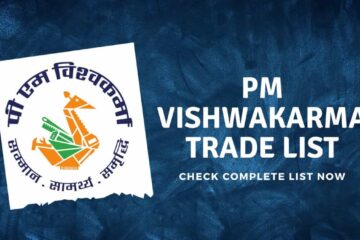
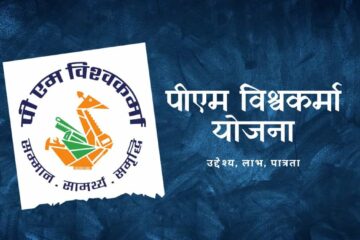
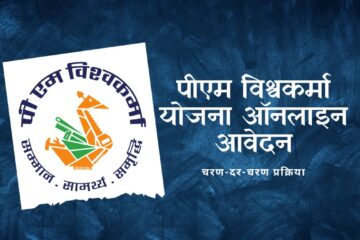
0 Comments